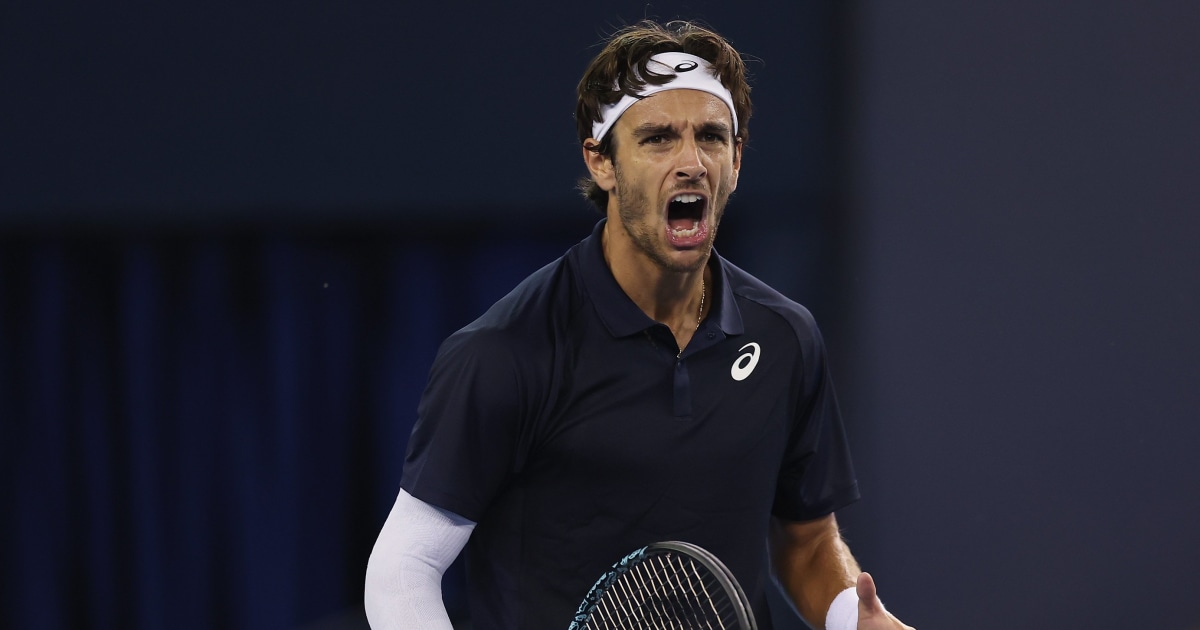Lorenzo Musetti, a rising star in the tennis world, found himself in hot water after an incident at the China Open. His on-court frustration led to an outburst directed towards the Chinese crowd, resulting in widespread condemnation. This article delves into the details of the incident, Musetti’s subsequent apology, and the broader implications for athletes and cultural sensitivity.
The incident highlights the intense pressure athletes face and the importance of maintaining composure, especially in international settings. Musetti’s apology underscores the need for cultural awareness and respect, even in moments of high stress.
We will explore the sequence of events, the reactions from fans and media, and the lessons learned from this unfortunate episode. Understanding the context and consequences of Musetti’s actions provides valuable insights into the responsibilities of public figures.
The Incident at the China Open
During his round-of-32 match against France’s Giovanni Mpetshi Perricard at the China Open, Lorenzo Musetti became visibly frustrated with the crowd. Specifically, he was annoyed by the coughing that disrupted his play. In the second-set tiebreaker, after losing a point, Musetti shouted, “these [expletive] Chinese are always coughing,” while gesturing towards the crowd and pointing to his throat.
Local media outlets further reported that Musetti was seen mouthing “damn Chinese.” These actions quickly ignited a firestorm of criticism on social media, with many accusing him of racism and disrespect towards the Chinese people. The outburst occurred during a crucial moment in the match, adding to the tension and scrutiny surrounding his behavior.
The incident was captured by cameras and shared widely, amplifying the negative reactions. Musetti’s words and gestures were seen as a blatant display of cultural insensitivity, leading to calls for an immediate apology and further action from tennis authorities.
Musetti’s Apology and Explanation
In response to the widespread criticism, Lorenzo Musetti issued an apology the day after the incident. In his statement, he said, “I would like to sincerely apologize for what I said in frustration yesterday during my match.” He clarified that his words were directed only at a few individuals in the crowd who were coughing repeatedly and disturbing his play.
Musetti emphasized that his comments were never intended to target the Chinese people as a whole. “They were never, in any way, meant for the Chinese people,” he stated. He attributed his outburst to the stress and tension of the second-set tiebreak, acknowledging that this was “no excuse at all” for his behavior.
While his apology aimed to mitigate the damage, it was met with mixed reactions. Some accepted his explanation as a genuine expression of regret, while others remained skeptical, arguing that his initial comments reflected a deeper prejudice. The apology, however, marked a crucial step in addressing the controversy and attempting to repair his image.
Comparison to Desirae Townsend’s Incident
Musetti’s situation bears resemblance to a previous incident involving American tennis player Desirae Townsend, who also faced criticism for comments made in China. Townsend had expressed shock and confusion over local delicacies served at a buffet, including bullfrogs and soft-shelled turtles. Her remarks were perceived as culturally insensitive, leading to significant backlash.
Like Musetti, Townsend issued an apology shortly after, stating that she “had nothing but the most amazing experience” in China and that her previous remarks were “not representative of that at all.” Both incidents underscore the challenges athletes face when navigating cultural differences and the potential for unintentional offense.
These situations highlight the importance of cultural awareness training for athletes who compete internationally. Understanding and respecting local customs and traditions can prevent misunderstandings and promote positive interactions between athletes and fans.
Musetti’s History of Unsportsmanlike Conduct
This is not the first time Lorenzo Musetti has been involved in controversies related to his on-court behavior. In June, he received a warning for unsportsmanlike conduct after accidentally kicking a tennis ball at a line judge during a match at the French Open. He apologized for the incident, stating that he “really didn’t want to harm nobody” and that it was right to receive a warning.
These incidents raise questions about Musetti’s temperament and his ability to manage his emotions during high-pressure situations. While passion and intensity are often seen as positive attributes in sports, it is crucial for athletes to maintain control and respect for the game and its participants.
Moving forward, Musetti may need to focus on developing strategies for managing his emotions and avoiding future incidents of unsportsmanlike conduct. This could involve working with sports psychologists or other professionals to improve his mental game.
Conclusion
Lorenzo Musetti’s apology to Chinese fans marks a crucial step in addressing the fallout from his on-court outburst. The incident serves as a stark reminder of the importance of cultural sensitivity and the responsibilities that come with being a public figure. While his apology has been met with mixed reactions, it underscores the need for athletes to be mindful of their words and actions, especially in international settings.
The similarities between Musetti’s situation and Desirae Townsend’s incident highlight the challenges athletes face when navigating cultural differences. Both cases emphasize the importance of cultural awareness training and the potential for unintentional offense. As athletes continue to compete on a global stage, understanding and respecting local customs and traditions will be essential for fostering positive relationships with fans and communities.
Ultimately, Musetti’s actions and subsequent apology provide valuable lessons for athletes and public figures alike. Maintaining composure, respecting cultural differences, and taking responsibility for one’s actions are critical components of professional conduct. As Musetti moves forward, his ability to learn from this experience will be key to rebuilding his reputation and maintaining positive relationships with fans around the world.

Leave a Reply